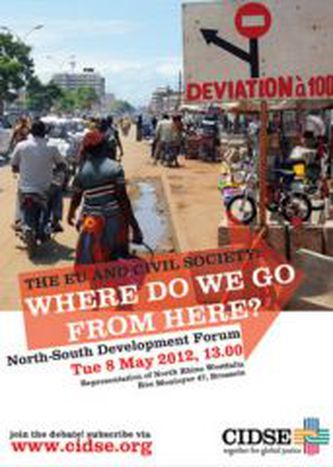
The EU and Civil Society: Where do we go from here?
Published on
By Francesca Cerri Civil Society Organisations (CSOs) are vital partners for decision-makers, as they are best placed to know population's needs in terms of development. The role of CSOs has to be strenghten from being implementing partners to sharing more responsibility with the State as the developing countries claim ownership of their own development.
CIDSE Forum, CIDSE network and over twenty Southern civil society representatives joined a public debate about the changing political and institutional context of EU development cooperation and how this impacts the relationship between the EU and CSOs.
Recent developments at global and EU level demonstrate the attempt to set up a new framework that allows CSOs to better play their role as actors in development. Crucial achievements have been made in processes such as the 2011 Busan Forum on Aid Effectiveness. However, it remains to see how agreed principles will be further implemented in upcoming decision-making.
Kristian Schmidt, Director of Human and Society Development (DG DEVCO), outlined that the Civil Society is a privileged partner of the EU. The Commission provides EU NGOs and Southern NGOs with financial support equal to 12-15% of EU funds through geographic and thematic programmes. He considers that this partnership is mature enough to move beyond the funding issue and establish a strategic partnership. Therefore, the involvement is no longer limited to a participation in service delivery, but aims at strengthening the capacity of Non-State Actors to become key actors of democratic governance processes. As matter of fact, in October 2012 a new EC communication on development cooperation with CSOs will aim to set new directions, particularly in the areas of an enabling environment for CSO work and make the Government accountable for it, cooperation with other actors and capacity building.
Chris Bain, President of CIDSE and Director of CAFOD UK, with the sentence “the proof for the pudding is in the eating”, emphasizes that the relationship between the EU and CSOs cannot be a tick box but has to be defined by inclusive and participatory processes in order to have a real and lasting impact.
Safia Abdi Dima, Programme officer, Cordaid Kenya, highlights that most CSOs are very good at service delivery and, in particular, at reaching the marginalized groups. By doing so, they can draw their legitimacy and mandate at national level. CSOs are ready to take up demand for governance and democracy and they can easily guide development innovation on the ground. Yet, they are not able to influence policy and practices and they are in strong need of capacity building from the EU.
Thijs Berman, MEP, straightening Civil Society is an overarching objective for the EU. In order to implement the development objectives, the role of Parliaments and Local Authorities should be strongly reinforced. The EU must put more pressure on Governments to guarantee adequate space for CSOs and give great attention by clearly stating and committing to this fundamental issue in the next DCI proposal.
CSOs and activists worldwide contribute in unique and essential ways to development as innovative agents of change and social transformation. A diverse, strong and independent civil society sector is essential for the long-term, sustainable and just reduction of poverty.



